wild recuperations. material from below – WORKS
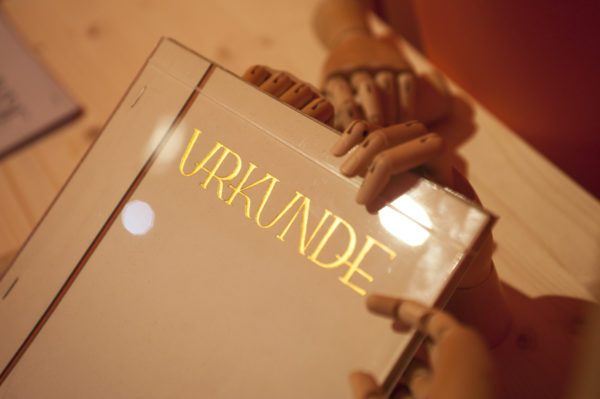
Urkunde 1989, Archive of the GDR Opposition, selected by Anna Zett, installation view Anna Zett, Deponie, 2018
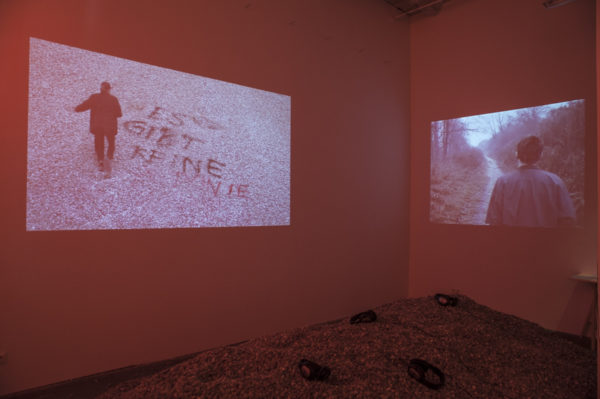
Anna Zett, Deponie, Installation, 2018
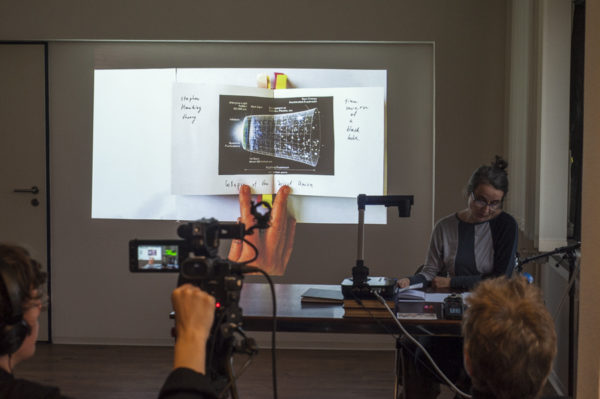
Nadia Tsulukidze, Big Bang Backwards, Performance, 4. November 2018
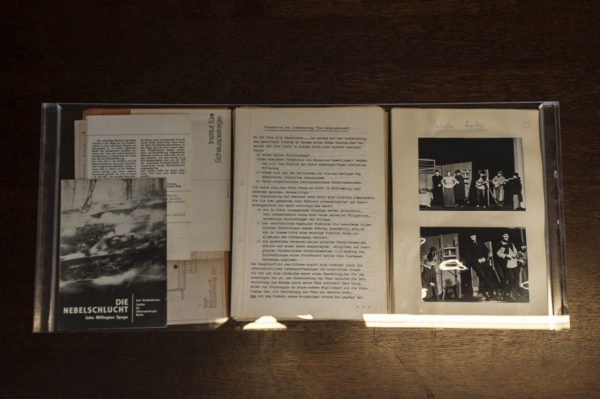
Document folder of Freya Klier, Archive of the GDR-Opposition, selected by Nadia Tsulukidze, 2018
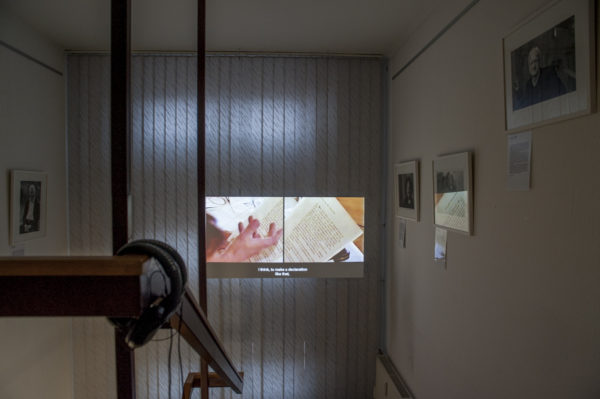
Elske Rosenfeld: A Vocabulary of Revolutionary Gestures: Interrupting: A bit of a Complex Situation, video installation, 2014
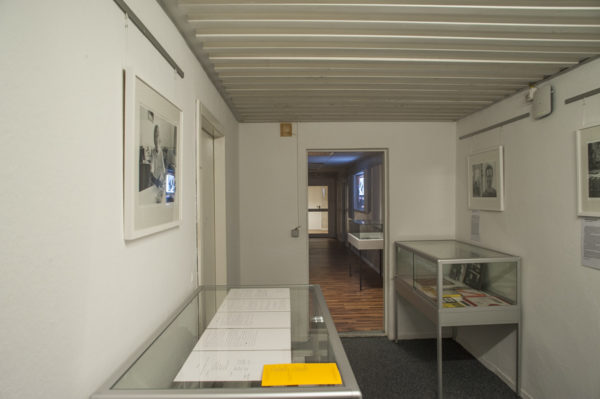
Notes by Klaus Freymuth about his film on Ingrid Köppe, Archive of the GDR-Opposition, selected by Elske Rosenfeld, and Elske Rosenfeld, A Vocabulary of Revolutionary Gestures: Repeating: Experiments / Framed, Video installation, 2018.
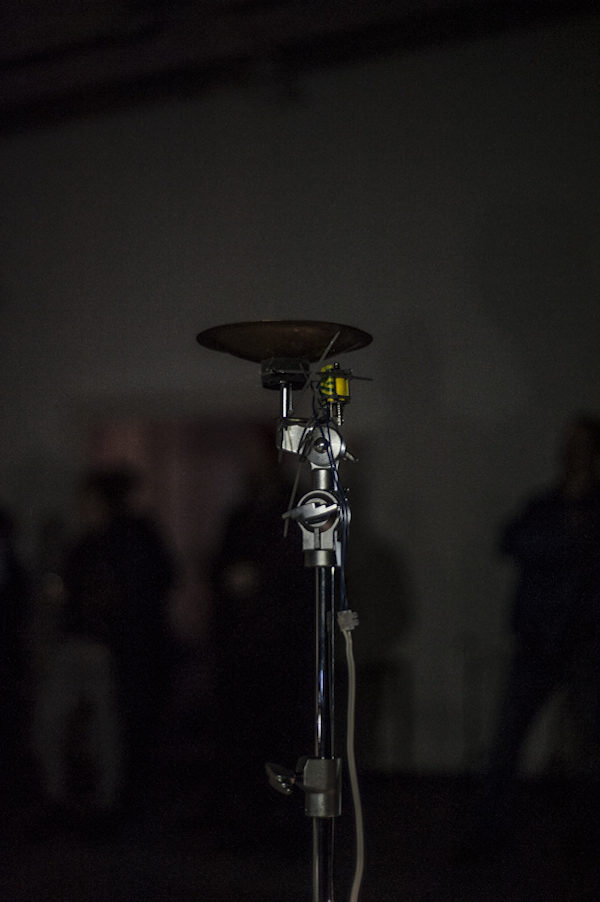
Technosekte + Henrike Naumann: BRONXX, performance at Haus 22/Former Stasi Headquarters, 2018.
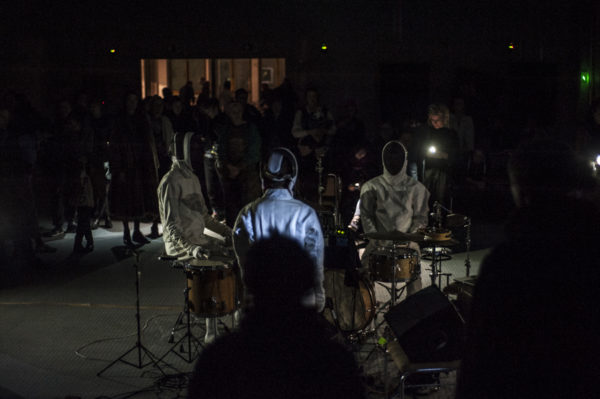
Technosekte + Henrike Naumann: BRONXX, performance at Haus 22/Former Stasi Headquarters produced for wild recuperations. material from below, 2018.
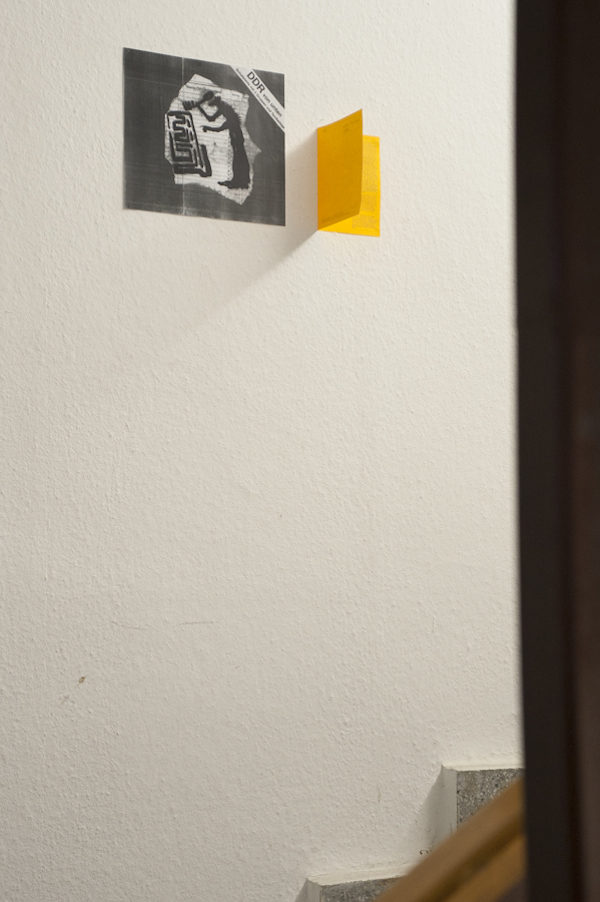
DDR von Unten, record cover 1983, selected from the Archive of the GDR-Opposition by Technosekte+Henrike Naumann, 2018
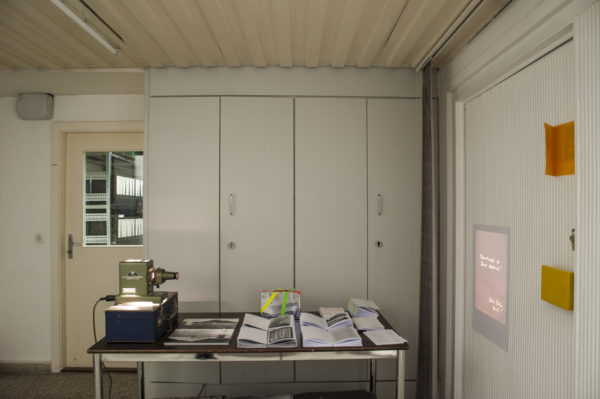
Exhibition view. All fotos: Emma Haugh
4 November – 16 December 2018
The exhibition wild recupreations. materials from below. Artistic Research in the Archive of the GDR-Oppostion is on view in two locations:
Archiv der DDR-Opposition (Haus 17) und Haus 22 – Stasizentrale. Campus für Demokratie
Ruschestraße 103, 10365 Berlin
Opening hours: Monday, 3-6 pm and Wednesday, 3-8 pm as well as 2-6 pm on Saturday 15 and Sunday 16 December
District Berlin
Bessemerstraße 2-14, 12103 Berlin
Öffnungszeiten: donnerstags – samstags, 15-19 h
Anna Zett: Deponie (engl. Landfill)
Installation: gravel, 2-channel video, wooden objects, certificate Vierzig Jahre (engl. Forty years) (1989) in original and copy, 2018
Deponie is a work exploring language as part of the human environment, on the dead, “concrete” or petrified language of the GDR system, on its (re-)animation in the opposition. What makes a living language, to what extent is it a political goal today? Deponie emerges from Zett’s research in the archives of the GDR opposition on the environmental movement and her regular visits to a complex post-industrial ecosystem in the east of Leipzig, shaped by gravel sand mining and concrete factories. Asking questions about language and the way in which it is part of political environments and upheavals, Zett deals with the environmental movement of the GDR and the 1989 revolution. Two videos gather different bodies, languages, and environments into interaction. They can be watched while sitting on a large pile of gravel – a place of observation that is unstable, mobile, and at the same time of stony longevity and toughness. The film, shot on the site of the gravel mine, shows a figure spray-painting on a mountain of gravel and it shows how the resulting graffiti collapses as the stones begin sliding. Words, their poetics and violence are deposited among the pebbles, which demand both change and an earth-temporal horizon. In addition to the choreographic disappearance of the mountain and sprayer, archival clips show protagonists of the GDR environmental movement breaking up the structures, languages and socialities of the state-socialist regime. The edit interweaves excerpts from the clandestinely produced documentaries on the handling of garbage and waste with sound recordings from a 1986 subcultural poetry evening. Documentation of a painting action at the Berlin Wall in November 1989 meet a campaign video clip of the Socialist Party and playful-dramatic scenes from the second occupation of the Berlin Stasi Headquarters.
By editing the video in an associative and rhythmical manner, Zett explores performative language forms which manifest the shifts, desires, and suspicions of a historical moment. Many of the opposition’s political proposals formulated within this given period, shortly before the reunification, were subsequently dumped like superfluous garbage. Deponie brings into play the resonances, frictions, and historical grit of the terms ‘Deponie‘ and utopia as connecting, questioning elements between archives and landscapes, bodies and ideologies, insurmountable remains, and political possibilities.
Elske Rosenfeld: A Vocabulary of Revolutionary Gestures: Interrupting: A bit of a Complex Situation
2-channel video, 14 min, 2014
A Vocabulary of Revolutionary Gestures: Repeating: Experiments / Framed
This video work was created during the exhibition period and presented on 16 December 2018, House 22
Elske Rosenfeld (born in Halle/Saale, GDR, lives in Berlin) works in various formats on the history of dissidence in Eastern Europe and on the events of 1989/90. She has been working in the archive of the GDR opposition for almost ten years. The idea for collaborative artistic research at the archive arose from this long-term engagement. Her ongoing project A Vocabulary of Revolutionary Gestures uses materials from 1989/90 and recent global protests and uprisings to investigate how political events manifest and inscribe themselves in the bodies of their protagonists.
A bit of a Complex Situation (2014) is an intervention into footage from the first meeting of the GDR’s Central Round Table on December 7, 1989. In the 10-minute scene filmed by filmmaker and member of the New Forum Klaus Freymuth, participants are trying to agree on a response to a demonstration that is passing the building. Sounds from the demonstration can be heard ebbing and swelling outside the window, as the participants debate. The demonstrators are never seen, only heard. The 2-channel projection shows the scene in its entirety. It unfolds as a series of intervention into the material that are themselves based on motions and gestures taken from the footage: pans, zooms, the shaking of the camera, the gestures and movements of the participants, the different qualities and sources of sound. These are amplified, repeated, looped, in order to confront and confound notions of inside and outside, language and body, representation and embodiment.
Versuche / Framed is a new work in the Vocabulary-cycle, developed for the project wild recuperations. material from below. In video sketches for an election spot from November 1990, only roughly cut together by Klaus Freymuth, one sees and hears how the filmmaker – a protagonist of the events – positions and films two former members of the Round Table – Ingrid Köppe and Wolfgang Ullmann –as they watch his recording of one of these meetings. In her adaptation, Rosenfeld plays with the different filmic and corresponding temporal frames, drawing attention to the changing contexts in which political events are given meaning. In all of these nestet frames, bodies come to the fore, as language meets its limits.
Nadia Tsulukidze: Big Bang Backwards / Urknall rückwärts
Videoperformance, 50 min, 2018.
Using methods from dance, choreography, performance, video, drawing, text, and collage, Nadia Tsulukidze (born in Tbilisi, Georgia, lives in Berlin) explores the body as a field of constant negotiation between social construction and personal desires and decisions. She defines this negotiation process as performative. In self-experiments, she relates herself to an inner “other” and investigates their different (trans-)formations within post-socialist gender- and migration-related contexts. With the video/performance work “Big Bang Backwards”, created for “wild recuperations. material from below” in the Archive of the GDR opposition, she explores connections between her own biography and that of an East German theatre director, author and dissident. Tsulukidze’s artistic research in the archive developed in the form of a diary in which the life and work of the opposition member interweave with her own.
Diaries are a form of writing to oneself, in which the ego is both reader and narrator. The persona that emerges from Tsulukidze’s artistic diaries is a mirror figure that draws together various political, psychological, physical-spatial and temporal cosmoi. History emerges as the interweaving of concrete experiences and physical-social performances, e.g. the claustrophobia of a woman in the GDR and that of a Georgian migrant in post-socialist Germany. Tsulukidze uses biography and documentary work as narrative practices with a focus on their imaginary and intersubjective content. The narrative is reinforced and complicated by metaphysical, poetic, and political extensions, sketches, and quotations. The lecture performance combines notes from the diaries with archive material about the activism and artistic work of the theatre maker, and unsent letters from the artist to her.,
Technosekte + Henrike Naumann: BRONXX
Performance on 16 December 2018, Haus 22
Growing up in East Germany, Henrike Naumann (born in Zwickau, GDR, lives in Berlin) experienced right-wing extremist ideology as a dominant youth culture in the 1990s. Her work reflects on the history of right-wing terrorism in Germany and today’s widespread acceptance of racist ideas. She is interested in the mechanisms of radicalisation and how they are linked to personal experiences and youth cultures. She explores the friction between opposing political opinions in dealing with taste and personal everyday aesthetics. In her immersive installations she combines video and sound with scenographic spaces. The focus of her work is broadened by the confrontation with global connections between youth cultures and the reversal of cultural ‘othering’.
BRONXX, an attempt to create an alternative system of communication for speaking about the Stasi and the opposition through the means of experimental music, is a performance by Technosekte and Henrike Naumann that results from their research in the archive of the GDR opposition.
BRONXX deals with the connection between the GDR underground and IM-activities (unofficial collaborator). The dissonances and contradictions of this complex entanglement lead to the limits of language and demand other forms of historicity: With BRONXX Technosekte and Naumann examine an alternative communication system which questions history as a ritual and employs rhythm as technology that unites ritual and coding possibilities. In order to approach the levels that endure beneath the immediately perceptible, BRONXX creates a temporary resonant space in which the transitions between animate and inanimate actors, between spirituality and technology, different orders of time and ideologies become fluid. A kind of ‘Stasi-ghost-exorcism’ in the former centre of the GDR Stasi apparatus and at the same time a reminder of the variations of the GDR underground as something fleeting, something undocumented, something resisting surveillance.
